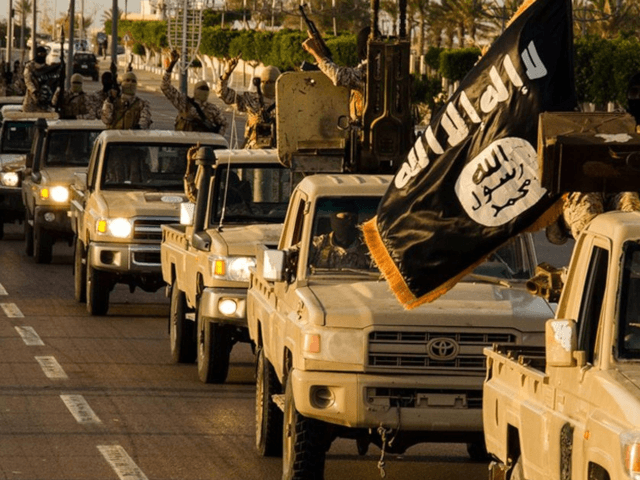The Afghanistan branch of the Islamic State (ISIS/ISIL) has amassed at least 5,000 fighters along the country’s northern border with former Soviet republics in Central Asia, a top Russian security official cautioned on Tuesday, noting that many of them fought in Syria.
Russian state-owned media revealed that Alexander Bortnikov, the chief of the Kremlin’s primary intelligence agency FSB, issued the warning during a meeting with intelligence officials in Tajikistan on Tuesday.
“Especially worrying is re-deployment of terrorist groups into northern provinces of Afghanistan,” Bortnikov declared, adding that the ISIS wing in Afghanistan had managed to gather 5,000 terrorists in the area, Khaama Press (KP) reports.
The 5,000 figure marks a significant increase from the “1,500 to 3,000” ISIS fighters that the U.S. Department of State (DOS) believed to be in Afghanistan in 2017.
Bortnikov reportedly called for increased border security to prevent spillover violence from flowing into the former Soviet republics, where the Kremlin still maintains a substantial presence, including several military bases.
The 5,000 figure is consistent with a recent U.S. Forces-Afghanistan (USFOR-A) estimate for the total number of ISIS fighters in the South Asian nation.
Last Friday, the Pentagon’s office of the inspector general (OIG) reported, “USFOR-A estimated, with low confidence, that there are as many as 5,000 ISIS-K fighters and 300 al Qaeda fighters in Afghanistan.”
The Associated Press (AP), however, suggests that Russia may be inflating the ISIS presence in Afghanistan.
“Russia has been expressing concern about the IS insurgency spilling over into Central Asia for several years. But some experts say the Kremlin is exaggerating the number of extremists to justify its outreach to the Taliban,” AP reports.
In late April, a U.S. official told the Agence France-Presse (AFP) news agency on condition of anonymity that following the collapse of the so-called caliphate this year, ISIS terrorists who participated in the bloody campaign in Iraq and Syria are heading to Afghanistan to continue their jihad and help carry out “spectacular” attacks against America.
“We know some have already made their way back here and are trying to transfer the knowledge, skills, and experience they learned over there,” the senior American intelligence official in Kabul told AFP, echoing the Russian security official.
“If we don’t continue counterterrorism pressure against [ISIS in Afghanistan], there will be an attack in our homeland — and a spectacular attack — probably within the year,” the official added.
The U.S. military has warned that ISIS has repeatedly attempted to establish a caliphate in Afghanistan, noting that the group presents a direct threat to the United States and other Western countries.
Known as the Khorasan Province (ISIS-K), the terrorist group’s Afghanistan branch carries the name of a historical region that covers large areas Afghanistan, Pakistan, Iran, Tajikistan, India, and other surrounding countries.
“Jihadists consider the Khorasan to be the area where they will inflict the first defeat against their enemies in the Muslim version of Armageddon. The final battle is to take place in the Levant – Israel, Syria, and Lebanon,” the Long War Journal reported in 2012.
ISIS officially announced the establishment of its province in Khorasan in January 2015, within a month after former U.S. President Barack Obama declared the American combat mission in Afghanistan over at the end of 2014 and withdrew most troops.
ISIS-K consists mainly of disgruntled former Tehrik-e Taliban Pakistan (TTP), Afghan Taliban, and other jihadis from South and Central Asia, DOS reports.
The Afghan and Pakistani branches of the Taliban consider themselves two distinct organizations led by different leaders.
U.S military officials have deemed Afghanistan’s opium-rich Nangarhar province, which straddles the country’s border with Pakistan, to be ISIS-K’s main stronghold in Afghanistan.
ISIS-K has expanded to areas in and around Nangarhar, namely the neighboring Kunar province, which also borders Pakistan.
Since ISIS established its presence in Afghanistan, the Afghan Taliban has been fighting the group for territory and influence.
The Afghan Taliban, which controls or contests about half of Afghanistan, remains the most potent jihadi group in the country.
Pentagon officials have noted that the Afghanistan-Pakistan region is home to the highest concentration of jihadi organizations in the world.
That means ISIS-K can recruit from a large pool of jihadis.
Contradicting the Pentagon’s December 2018 assertion that ISIS-K had been “weakened,” the U.S. Special Inspector General for Afghanistan Reconstruction (SIGAR), a watchdog agency, noted in March that the terrorist group now “poses a greater security threat to the Afghan people and security forces than it did in 2016.”
“[Since 2017,] IS-K has gone from being concentrated in a few districts in Nangarhar Province in eastern Afghanistan to having a limited presence in two other provinces—Kunar and Jowzjan,” it added.
The northern province of Jowzjan borders the former Soviet republic of Turkmenistan.
SIGAR credited the Taliban with slowing ISIS expansion into northern Afghanistan.
The watchdog agency also acknowledged that U.S. President Donald Trump’s unprecedented airstrike campaign gives the Afghan security forces “an obvious advantage in confronting IS-K and has had important consequences for Afghan security.”
Over the last year, Trump administration officials intensified peace negotiations with the Taliban after making the political reconciliation between the terrorist group and the Afghan government the primary tenet of its strategy to end the war.
So far, American and Taliban negotiators have reached a draft agreement on a framework for peace in Afghanistan — the withdrawal of foreign forces in exchange for Taliban assurances that it will deny safe havens to international terrorist groups like ISIS and al-Qaeda.

COMMENTS
Please let us know if you're having issues with commenting.